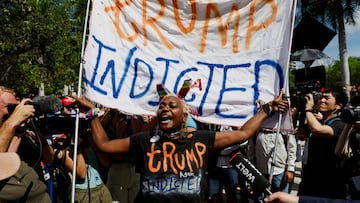What does it mean to be indicted? What is the difference between being indicted and charged?
Often thought to be the same, there is a difference between being charged and being indicted, but both indicate that a person may face a criminal trial.

Americans are getting another crash course in legalese with the high profile indictments and charges against former President Donald Trump. Because the two terms are often intermingled there exists some confusion about what each word means.
In both cases, it has been found that a person on the receiving end may face a criminal trial. The difference comes basically from the type of crime, misdemeanor versus felony, and thus how a prosecutor goes about determining whether a person should face trial.
What is the difference between being indicted and charged?
Whether or not a person should be indicted is decided by a grand jury. These are convened by a prosecutor who wants to bring charges and a potential felony case against an individual. Grand juries are required for all federal felony cases, but not federal misdemeanor cases, as well for serious felony cases in most states.
While it is a constitutional requirement at the federal level for felony cases, it has been determined by the Supreme Court that it is not mandatory for federal misdemeanors, nor at the state level under the US Constitution.
This indictment of Donald Trump is the most serious and most consequential thus far and will stand as a stark reminder to generations of Americans that no one, including a president of the United States, is above the law.
— Chuck Schumer (@SenSchumer) August 2, 2023
My statement with @RepJeffries: pic.twitter.com/nJUhkBBe4L
Generally, for lesser crimes, misdemeanors, the prosecutor can file charges without having to convene a grand jury. So simply put, criminal indictments are brought by a grand jury and charges by the prosecutor.
What does it mean to be indicted?
A grand jury is “an impartial group of citizens” usually consisting of between 16 and 23 unbiased members of the public. They will listen to the prosecutor’s case and evidence in addition to testimony from witnesses. Only certain people are allowed to attend the proceedings themselves. The Department of Justice gives the example that a witness who is compelled to testify is not allowed to have an attorney present with them.
At the end, the grand jury will vote in secret if there is enough evidence to justify an indictment and thus the charges being filed in court. Of the jury pool, at least twelve must agree on the indictment(s) for one or more to be issued.
“The indictment contains the basic information that informs the person of the charges against them,” according to the Department of Justice. Should the grand jury find that there isn’t enough evidence to validate charges, then everything that has been presented to the grand jury would be sealed in order to prevent reputational harm to the defendant and witnesses.
Analysis by Philip Bump: Donald Trump spent the hours after his indictment on Tuesday ensconced in the safest space he could muster.
— The Washington Post (@washingtonpost) August 3, 2023
He was at his private club, dining with two of his most important supporters: the CEO and the president of Fox News. https://t.co/vl4GYQJMHq
If a person is indicted does the prosecutor have to charge the defendant?
Related stories
Prosecutors have the discretion to drop charges against a defendant before or after an indictment or charging. There can be a number of reasons for this like the defendant being a first time offender or they decide to cooperate with authorities, i.e. “flip”, to take down a bigger fish in the supposed criminal enterprise. Sometimes there aren’t enough resources to prosecute all of the potential cases before the prosecution.
Additionally, problems could arise from the evidence that the prosecution has on hand to present. There may have been Fourth Amendment violations with evidence having been improperly attained. A procedural mistake or technicality may result in the dismissal of charges as well. Or the victim may change their mind and decide against testifying against the accused.


